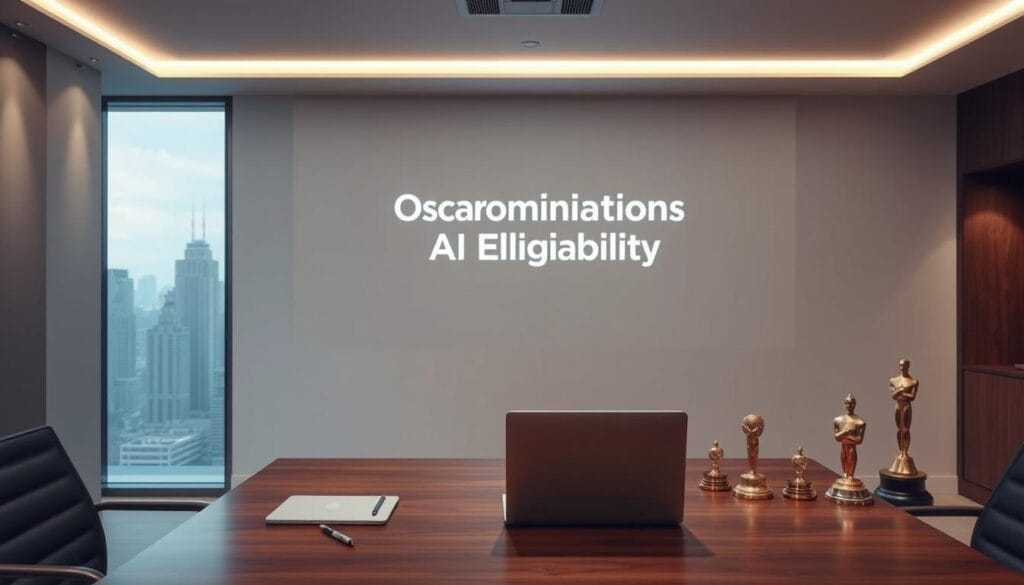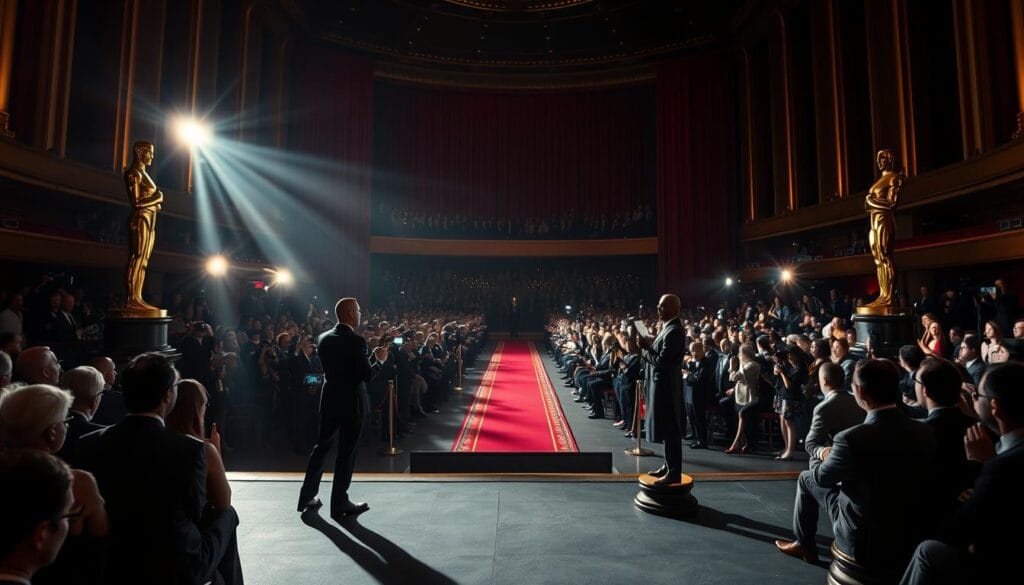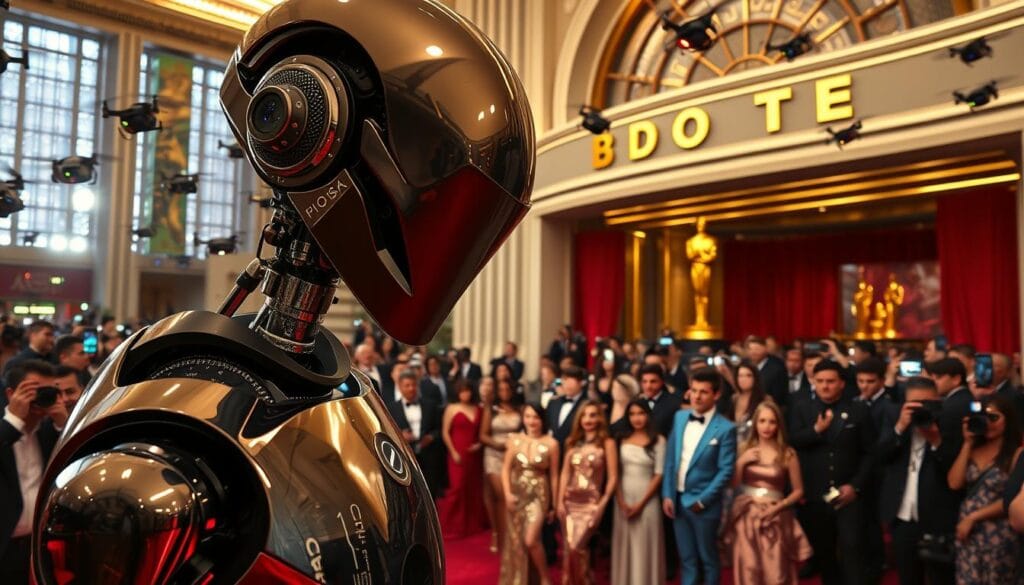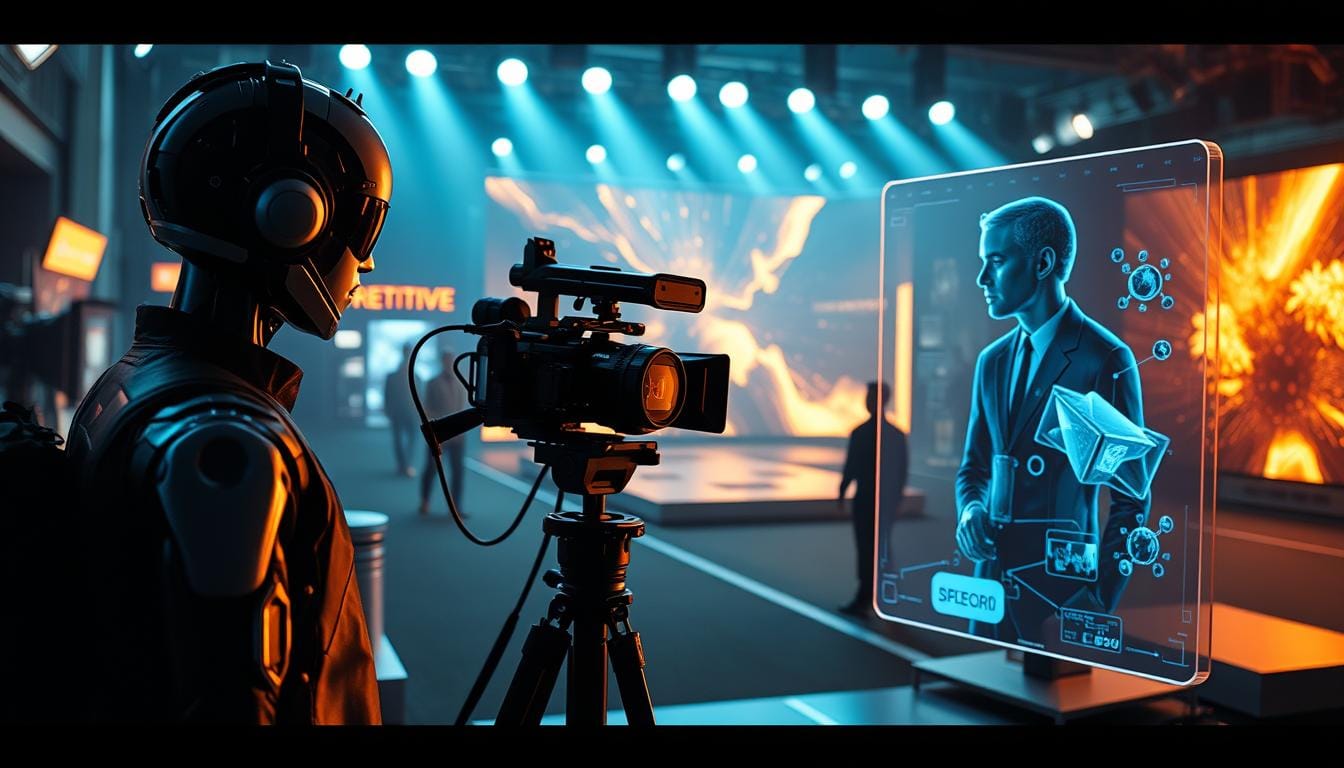The Academy of Motion Picture Arts and Sciences has made a big announcement. They say films made with AI can now win Oscars. This change marks a big shift in how movies are made, blending technology and creativity.
The Academy’s new rules say AI doesn’t change a film’s shot at winning. This shows that human talent is still key in making movies. As we look forward to the Oscar nominations in 2026, this change will likely shape the future of cinema.
Key Takeaways
- The Academy now allows films made with AI to be nominated for Oscars.
- This decision underscores the influence of technology in art and storytelling.
- Generative AI’s presence won’t affect the nominations or outcomes.
- Human creativity remains at the forefront of the filmmaking process.
- Upcoming Oscar nominations in 2026 will reflect this new guideline.
The Academy’s New Stance on AI in Films
The Academy has updated its rules on AI in movies. This change brings new challenges for filmmakers. The new rules say AI won’t help or hurt a movie’s chances of winning.
This approach keeps human creativity at the center. It shows the Academy’s dedication to artistic integrity. The rules highlight the importance of human touch in filmmaking.
Films made with AI can win Oscars, Academy says
The world of making movies is changing fast. The Academy now says films made with AI can get Oscar nominations. This big change means a lot for filmmakers as they explore new ways to create.
Implications for Future Nominations
Now, Oscar nominations include films that use AI, as long as humans are involved too. This change affects how movies are made and told. It could lead to more creative stories and better visuals.
How the Oscars judge films might also change. They might look more at the art and less at just the technology used.
Overview of the Academy’s Update
The Academy has made some big changes to how they pick Oscar nominees. They’ve set clear times for when to submit and when to vote. This helps the industry, which is getting bigger and more tech-savvy.
These updates are not just about who can enter. They’re about making the film world more creative and welcoming to everyone. The Academy wants to keep up with the latest in filmmaking.

The Controversy Surrounding AI and Nominations
The use of AI in making movies has sparked a lot of debate. This debate is centered around the AI controversy Oscars. Films like “The Brutalist” and “Emilia Pérez” are up for Best Picture, raising questions about true creativity.
Some say using AI for things like improving dialogue or changing voices might lessen the creative input. This makes people wonder if the art is still genuine.
With industry strikes happening, the use of AI in filmmaking is under more scrutiny. It’s not just about the Oscars anymore. It’s about how AI affects jobs and the true art of filmmaking.
As filmmakers use AI to explore new ideas, finding a balance is key. They need clear rules and open talks to ensure the art stays true to its roots.

Notable AI-Involved Films in the Oscar Race
Technology is changing how movies are made. Films like “The Brutalist” and “Emilia Pérez” show how AI can now be part of the Oscars. This change is big for the film industry.
A Closer Look at “The Brutalist”
“The Brutalist,” by Brady Corbet, is a The Brutalist Oscar nominee. It uses AI to improve actor performances. This includes adapting language and creating architectural designs.
This film shows how technology can make stories better. It adds depth without losing the human touch.
Exploration of “Emilia Pérez”
“Emilia Pérez” is another example of Emilia Pérez AI use. It uses digital tools to enhance vocal performances. This film pushes creativity while staying true to traditional filmmaking.
Both films show how AI can work with artistic vision. They open up new possibilities in filmmaking.

The Role of Human Creativity in AI-Driven Films
In filmmaking, human creativity is key. AI has changed the game, but human touch is still essential. It’s the mix of human vision and AI that makes films special.
When humans work with AI, they can do more creative things. AI helps with editing and effects, freeing up humans to think big. This teamwork brings new ideas to the table, making movies even better.
New Voting Requirements for Oscar Members
The Academy of Motion Picture Arts and Sciences has made big changes to Oscar voting rules. These changes ensure that all members know the films they’re voting on. The goal is to make the awards more credible by requiring members to meet certain voting standards.
All Films Must Be Viewed to Vote
Now, every Academy member must watch all nominated films. This rule is to stop uninformed voting. Such voting has hurt the awards’ reputation in the industry.
Changes in Voting Process Explained
The Academy has introduced a new screening platform. It tracks if members have seen all the nominated films. This step aims to make voting better and encourage more involvement from members. It’s all about making sure the Oscars show a true consensus based on knowledge.
| Requirement | Description |
|---|---|
| Film Viewing | All nominated films must be viewed by voters. |
| Voting Accountability | Members are held accountable for informed voting. |
| Screening Platform | New technology tracks film viewings. |
| Engagement Standards | Encouragement for active participation in the voting process. |
A Historic Shift: AI in the Academy Awards
The Academy Awards have welcomed AI in filmmaking, marking a big change. This shift changes how we see nominations in the industry. It shows how our views on creativity and technology are evolving.
AI at the Oscars could change how we tell stories. It helps both experienced and new filmmakers. This opens up new ways to innovate and tell stories.
But, what about human creativity in this new world? As AI becomes more involved, it mixes up who is the creator and what is the creation. The industry must find a balance between technology and human touch. The future of AI in movies is both promising and challenging for this art form.
AI’s Influence on Hollywood and Filmmaking
Hollywood is changing fast, thanks to generative AI trends. These trends are changing how movies are made. Now, people in the film industry are looking at new ways to tell stories.
AI is bringing new ideas to filmmaking. It helps with writing scripts, making special effects, and trying out new styles. Let’s dive into these changes and what they mean.
Trends in the Use of Generative AI in Film
- Script Generation: AI tools help writers by looking at what makes good stories.
- Visual Effects Enhancement: AI makes it easier to create amazing visuals, saving money and boosting creativity.
- Post-Production Efficiency: AI helps edit movies faster, making them ready sooner.
- Personalization of Content: AI makes movies more tailored to what viewers like, making them more engaging.
Looking into generative AI trends shows how AI is changing movies. It’s not just about making things faster. It’s also about how it changes stories and how we watch them. Filmmakers need to think about the right balance between using AI and keeping things human.
| Generative AI Applications | Benefits | Challenges |
|---|---|---|
| Script Generation | Speeds up writing process | Potential loss of originality |
| Visual Effects Enhancement | Cost-effective production | Risk of over-reliance on technology |
| Post-Production Efficiency | Faster project delivery | Quality control concerns |
| Personalization of Content | Enhanced viewer satisfaction | Ethical data usage issues |
Conclusion
The Academy’s recognition of AI in filmmaking is a big step forward. AI is changing how we tell stories, opening up new ways to express ideas. This change is part of a bigger trend in the film world.
It lets filmmakers use new tools to see things from different angles. This makes movies more interesting and engaging for people all over the world.
But, it’s important to remember that AI can’t replace human creativity. The debate about technology’s role in storytelling will continue to grow. It’s key to keep stories real and emotional, so they connect with viewers.
The Academy’s new view on AI will help keep tradition and innovation together. As filmmaking changes, we’re excited to see how these new tools will influence future movies. It promises a thrilling new chapter in the world of cinema.
FAQ
Can films that use artificial intelligence be nominated for Oscars?
Yes, the Academy of Motion Picture Arts and Sciences says films using AI can get Oscar nods. They make it clear that AI use doesn’t change a film’s chances for nomination.
How does the Academy assess films that incorporate AI?
The Academy now focuses on the human creativity in making a film. They say AI tools can help, but the story must come from human experience.
What changes have been made in the voting process for Oscar members?
Oscar voters must now watch all nominated films to vote. This rule aims to keep voters well-informed and engaged with the movies.
How does the integration of AI impact traditional filmmaking jobs?
AI’s use in filmmaking has sparked debate. Some worry it could change traditional jobs and the true art in movies.
What are some notable films that have used AI in their production?
“The Brutalist” and “Emilia Pérez” stand out for their AI use. They show how AI can enhance traditional filmmaking.
What are the implications of the Academy’s acceptance of AI in filmmaking?
The Academy’s nod to AI is a big change. It opens up new ways to tell stories but also raises questions about human artistry’s role.
How might AI reshape the future of storytelling in films?
AI is pushing filmmakers to try new things. It brings both new chances for creativity and ethical questions about using tech in making movies.





